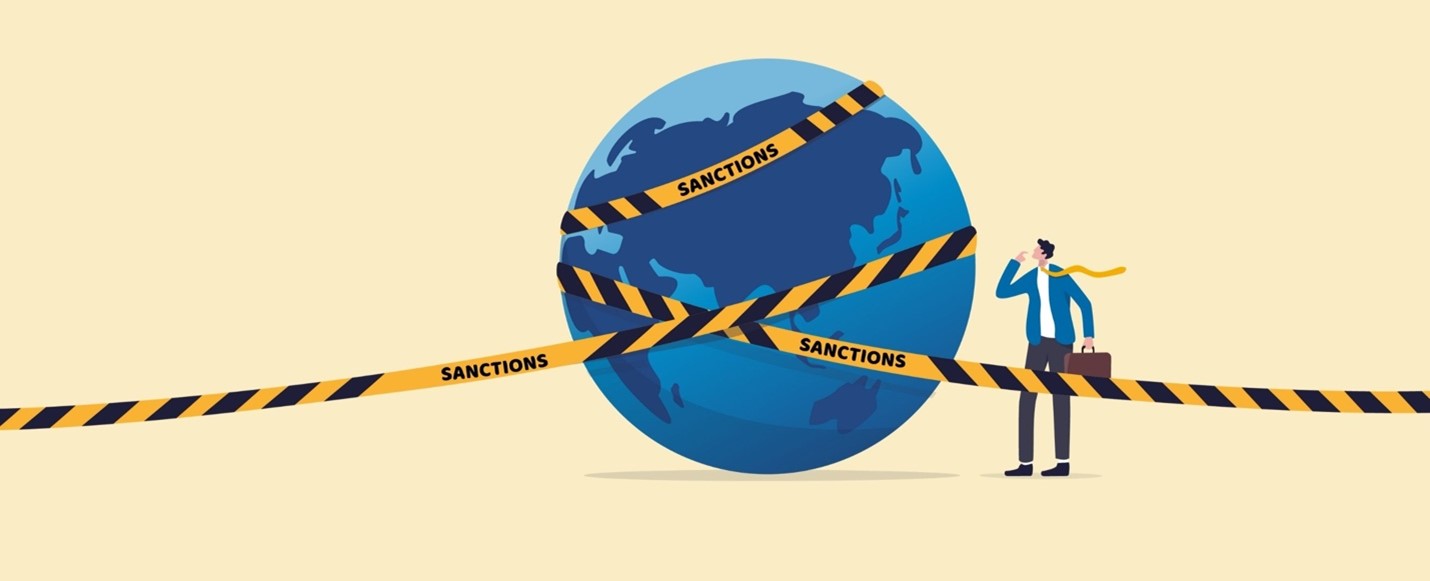By Melissa Hernandez

Economic sanctions are by no means a new tool for nations to conduct foreign policy. They have been utilized for centuries, starting from around the time Athens imposed a trade embargo against Megara in 432 B.C. [1] Today, economic sanctions are defined as the partial or complete withdrawal of financial relations between entities for policy purposes. [2] They can be targeted precisely at blocking certain transactions between businesses or individuals, or they can be comprehensive in prohibiting commercial transactions with an entire country. [3]
At present, the most popular sanctions are those imposed on Russia for its unprovoked invasion of Ukraine. As of August 16, 2022, more than 30 countries have imposed sanctions against Russia, and more than a thousand foreign companies have halted operations in the country. [4] While the Kremlin has utilized tactics to curb some of the effects from these sanctions, according to a World Bank report, Russia’s GDP is expected to plummet over 11% by the end of 2022—the largest drop since the collapse of the Soviet Union. [5] The goal of these sanctions is to hinder Russia’s ability to finance the ongoing invasion.
Despite the collective support to disrupt the Kremlin, many find themselves wondering if these sanctions will have their desired result. This is not the first time in modern history that Russia has faced sanctions primarily from Western nations. In 2014, Russia encountered significant sanctions for annexing Crimea, which for the most part were successful in their goal of weakening the Russian economy. [6] Other sanctions, however, have been met with substantial criticism for inflicting more damage than initially intended.
In 1990, the United Nations Security Council imposed heavy economic sanctions against Iraq for invading Kuwait. [7] The ultimate goal was to destabilize President Saddam Hussein’s regime by imposing the most comprehensive sanctions in history. [8] It is estimated that the economic sanctions cut Iraq’s GDP in half, but unfortunately caused around 100,000 to 227,000 deaths from 1991 to 1998 due to food scarcity. [9] It is regarded as “the worst humanitarian catastrophe ever imposed in the name of global governance.” [10] Much of the blame was cast towards the United States and Britain, mainly for their consistent refusal to concede to humanitarian efforts to aid civilians. [11] The aftermath of these sanctions highlighted the need to alter their implementation.
One of the most popular sanctions imposed by the United States is its embargo on Cuba. On February 3, 1962, President Kennedy executed the embargo to combat Fidel Castro’s communist regime. [12] Many scholars call for the end of the embargo, as it has not been effective in ending the humanitarian crisis caused by its communist leaders. In the summer of 2021, Cuba saw its largest antigovernment protest in decades, which was triggered by food, housing and medicine shortages exacerbated by the COVID-19 pandemic. [13] Cubans peacefully protested for their freedom and demanded the end of the dictatorship. Cuba’s president, Miguel Diaz-Canel, blamed the embargo for the shortages, and once again ignored what the protestors were truly pleading for: freedom from an oppressive communist regime. The regime quickly cut off all internet access for Cubans, arrested and beat protestors, and have once again successfully silenced the population, as the communist government still stands today while its people continue to lack access to basic needs. [14] While the Cuban embargo does not apply to food nor medicine and the US continues to sell millions of dollars’ worth of food to the nation, it is evident that it has not had its intended effect of subduing the regime. [15] If anything, it has allowed many to shift the blame from its authoritarian leaders.
Nonetheless, it is a fundamental part of international relations for a nation to express their refusal to accept and cooperate with an opposing regime. Therefore, it is important for scholars and policymakers to identify some important attributes for sanctions to have their intended impact. If sanctions are promptly imposed and their effects are seen quickly, they tend to have more of an impact as their economy has less time to prepare and adapt, and their leaders are more heavily pressured. [16] Another important aspect is keeping diplomatic channels open to encourage peace mediation and evaluate any threats of force or signs of aggression. [17] It is also significant to consider balancing different kinds of sanctions, such as those targeted toward the regime and its elites, and comprehensive sanctions which impact the nation as a whole. While the application of sanctions will vary in scope and effect depending on the situation, it is especially important to consistently evaluate their effectiveness and reach, as many are currently feeling the effects from the Russia-Ukraine conflict.
[1]Smart Sanctions: A Short History, Foreignpolicy.com, https://foreignpolicy.com/2012/04/23/smart-sanctions-a-short-history/ (Apr. 23, 2012).
[2] What Are Economic Sanctions?, Council on Foreign Rel., https://www.cfr.org/backgrounder/what-are-economic-sanctions (Aug. 12, 2019).
[3] Id.
[4] International Sanctions are Working: Russia feels economic pressure, U.S. Embassy in Geor., https://ge.usembassy.gov/international-sanctions-are-working-russia-feels-economic-pressure/ (Aug. 18, 2022).
[5] Infographic- Impact of sanctions on the Russian economy, European Council of the European Union, https://www.consilium.europa.eu/en/infographics/impact-sanctions-russian-economy/ (Aug. 19, 2022).
[6] Edward Hunter Christie, Sanctions after Crimea: Have they worked?, NATO Rev., https://www.nato.int/docu/review/articles/2015/07/13/sanctions-after-crimea-have-they-worked/index.html (July 13, 2015).
[7] Joy Gordon, The Enduring Lessons of the Iraq Sanctions, Middle East Rsch. and Info. Project, https://merip.org/2020/06/the-enduring-lessons-of-the-iraq-sanctions/ (last visited Sept. 16, 2022).
[8] Daniel W. Drezner, Sanctions Sometimes Smart: Targeted Sanctions in Theory and Practice, Oxford Acad., https://academic.oup.com/isr/article/13/1/96/1807429 (Mar. 4, 2011).
[9] Id.
[10] Id.
[11] Gordon, supra note 7.
[12] Cubabrief: Why JFK Placed an Embargo on Cuba, Cent. for a Free Cuba, https://www.cubacenter.org/archives/2022/2/8/cubabrief-why-jfk-placed-an-embargo-on-cuba-cuba-food-crisis-caused-by-communist-policies-jos-mart-warned-communism-would-lead-to-generalized-serfdom (last visited Sept. 16, 2022).
[13] Armando Chaguaceda & Coco Fusco, Cubans Want Much More Than an End to the U.S. Embargo, The New York Times, https://www.nytimes.com/2021/08/07/opinion/sunday/cuba-embargo-protest.html (Aug. 17, 2021).
[14] Id.
[15] Id.
[16] Maite Knorr-Evans, Have US Sanctions worked in the past?, AS.com, https://en.as.com/en/2022/02/27/latest_news/1645984058_078800.html (Feb. 27, 2022).
[17] Id.
